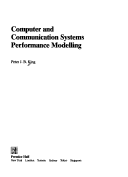Prentice Hall International Series in Computing Science
1 total work
"Computer and Communications Systems Performance Modelling" provides an introduction to the field of quantitative analysis of computer and communication systems performance and introduces some of the more powerful mathematical tools for analysing queuing systems, referring to realistic examples where appropriate. The author introduces Kendall's (extended) notation for describing queuing systems and the sample path arguments that lead to Little's result; reviews the elements of probability theory; provides a brief introduction to the theory of stochastic processing, in particular Markov processes, which play a central role in the analyses presented; examines simple MM1 queues in detail, starting with the time-dependent formulation and leading on to the steady state solution; considers multi-server Markovian queues - the analysis of MMI queues is extended to MMc queues and taken to the limit as a study of MMoo queues; discusses queues in which the service times can be generally distributed, and three different approaches which are used to derive the Pollaczek-Khintchine formula; and discusses systems which are unreliable and have servers that break down and can be repaired.
